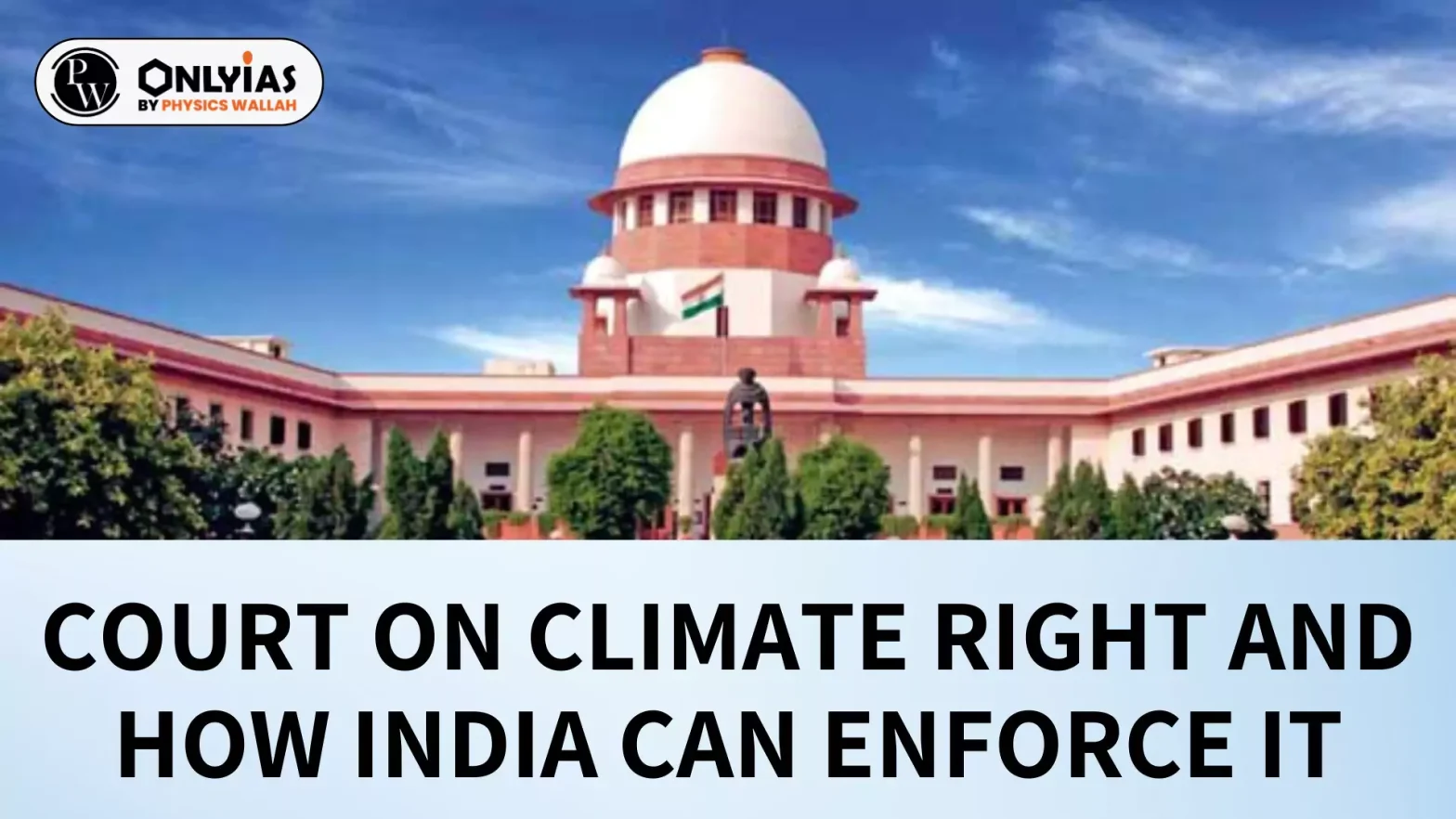Through its recent judgment in M.K. Ranjitsinh and Ors. vs Union of India & Ors., the Supreme Court of India has dropped a large rock into the relatively placid waters of India’s nascent climate change jurisprudence.
Court On Climate Right
- It has read into the Constitution of India the right to ‘be free from the adverse effects of climate change’, identifying both the right to life and the right to equality as its sources.
- As a new government considers its imperatives and agenda, Ranjitsinh provides an intriguing opportunity to think through and possibly enact much more systematic governance around climate change.
Enroll now for UPSC Online Course
A New Right Around Climate
- Scholars and legal practitioners are still unpacking the judgment.
- The issue before the Court was whether and how electricity transmission lines can be built through the habitat of the critically endangered Great Indian Bustard.
- The government claimed that a previous court order protecting the bird’s habitat had affected the country’s renewable energy potential.
- Modifying this order, the Court prioritised transmission infrastructure to enable accelerated development of renewable energy to address climate change.
- But the more seismic aspect of the judgment was the newly minted ‘climate right’ rooted in the constitutionally guaranteed right to life (Article 21) and right to equality (Article 14).
- Reading this right into the Constitution potentially opens the door to climate litigation, empowering citizens to demand from the government that this right be protected.
- But the judgment also leaves unresolved questions.
- Does the Court overstate the large-scale clean energy agenda as the main pathway to avoiding climate harms and, correspondingly, understate climate adaptation and local environmental resilience?
- Just how will this right against the adverse effects of climate change be protected?
- And what might it mean for the agenda of the newly formed government?
- One way forward is the slow accretion of judicial decisions around this right. But another is new legislation to actively realise a right against the adverse effects of climate change.
- The former approach, the proliferation of court- based action through enhanced litigation around climate claims, will likely lead, slowly and over time, to an incomplete patchwork of (judiciary- led) protections.
- As with many other well-meaning judicial orders directing the protection of fundamental rights, realising climate rights could become contingent on the passage of several subsequent policy actions.
- Moreover, a patchwork approach is less likely to chart an overarching framework to guide future policy.
- Is the latter approach, climate legislation, then a preferred approach to protect climate rights?
- The judgment itself states that there is no ‘umbrella legislation’ in India that relates to climate change.
- And in so doing, seems to implicitly recognise the merits of an overarching, framework legislation.
- Drawing from the experience of other countries, framework legislation can bring several advantages.
- It can set the vision for engaging with climate change across sectors and regions, create necessary institutions and endow them with powers, and put in place processes for structured and deliberative governance in anticipation of and reaction to climate change.
Indian Context is Important
- These are important advantages, and good reasons for India to consider climate legislation.
- But at the same time, it is essential that Indian climate legislation not blindly copy other countries, and is tailored to the Indian context.
- Undoubtedly, India needs to transition to a low- carbon energy future, an imperative that is highlighted in the Ranjitsinh judgment.
- But this, by itself, is not nearly enough to enforce right against the adverse effects of climate change.
- Climate legislation should also create a supportive regulatory environment for more sustainable cities, buildings, and transport networks.
- It should enable adaptation measures such as heat action plans sensitive to local context.
- It should provide mechanisms for shifting to more climate-resilient crops.
- It should protect key ecosystems such as mangroves that act as a buffer against extreme weather events.
- And, it should actively consider questions of social equity in how it achieves these tasks.
- In brief, it should provide a way of mainstreaming and internalising climate change considerations into how India develops.
- Nothing less is required to make progress toward avoiding the adverse effects of climate change.
Check Out UPSC CSE Books From PW Store
Conclusion
A comprehensive climate legislation tailored to India’s context is crucial to protect climate rights and ensure sustainable development, adaptation, and resilience against climate change.
![]() 1 Jul 2024
1 Jul 2024
